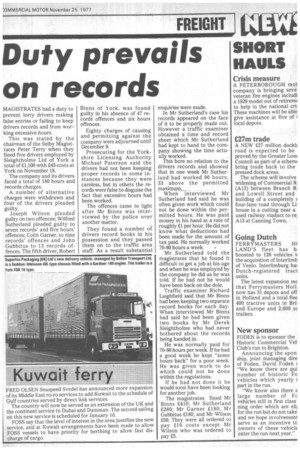Duty prevails on records
Page 23

If you've noticed an error in this article please click here to report it so we can fix it.
MAGISTRATES had a duty to prevent lorry drivers making false entries or failing to keep drivers records and from wor-' king excessive hours.
This was stated by the chairman of the Selby Magistrates Peter Terry when they fined five drivers employed by Sleightholme Ltd of York a total of £1,100 with £45 costs at York on November 18.
The company and its drivers faced a total of 180 hours and records charges.
A number of alternative charges were withdrawn and four of the drivers pleaded guilty. Joseph Wilson pleaded guilty on two offences; Wilfred Sutherland pleaded guilty to seven records' and five hours' offences; Colin Garner, to nine records' offences and John Gabbitus to 13 records offences. The fifth driver, Robert Binns of York, was found guilty in his absence of 47 records offences and six hours offences.
Eighty charges of causing and permitting against the company were adjourned until December 9.
Prosecuting for the Yorkshire Licensing Authority Michael Paterson said the drivers had not been keeping proper records in some instances because they were careless, but in others the records were false to disguise the fact that excessive hours had been worked.
The offences came to light after Mr Binns was interviewed by the police over another matter.
They found a number of drivers record books in his possession and they passed them on to the traffic area staff. As a result substantial enquiries were made.
In Mr Sutherland's case his records appeared on the face of it to be properly made out. However a traffic examiner obtained a time and record sheet which Mr Sutherland had kept to hand to the company showing the time actually worked.
This bore no relation to the drivers records and showed that in one week Mr Sutherland had worked 90 hours, 33 above the permitted maximum.
When interviewed Mr Sutherland had said he was often given work which could not be done within the permitted hours. He was paid money in his hand at a rate of roughly £1 per hour. He did not know what deductions had been made for the amount of tax paid. He normally worked 70-80 hours a week. • Mr Sutherland told the magistrates that he found it difficult to get a job at his age and when he was employed by the company he did as he was told. If he had not he would have been back on the dole.
Traffic examiner Richard Laighfield said that Mr Binns had been keeping two separate record books for each day. When interviewed Mr Binns had said he had been given two books by Mr Derek Sleightholme who had never bothered about the records being handed in.
He was normally paid for 70-80 hours per week. If he had a good week he kept "some hours back" for a poor week. He was given work to do which could not be done within the regulations.
If he had not done it he would soon have been looking for another job.
The magistrates fined Mr Binns £410; Mr Sutherland £280; Mr Garner £180; Mr Gabbitus £180; and Mr Wilson £50. They were all ordered to pay E10 costs except Mr Wilson who was ordered to pay £5.










































































































